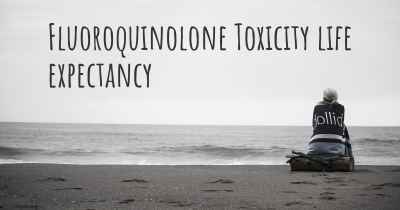Is Fluoroquinolone Toxicity hereditary?
Here you can see if Fluoroquinolone Toxicity can be hereditary. Do you have any genetic components? Does any member of your family have Fluoroquinolone Toxicity or may be more predisposed to developing the condition?

Fluoroquinolone toxicity is not considered hereditary. It is a condition that can occur in individuals who have been exposed to fluoroquinolone antibiotics. The adverse effects of these antibiotics can vary from person to person, and some individuals may be more susceptible to experiencing toxicity. However, there is no evidence to suggest that fluoroquinolone toxicity is passed down through genes or is hereditary.
Is Fluoroquinolone Toxicity hereditary?
Fluoroquinolones are a class of antibiotics commonly used to treat various bacterial infections. While they are generally effective in treating these infections, there have been concerns about their potential for toxicity and adverse effects. One question that often arises is whether fluoroquinolone toxicity can be hereditary.
Fluoroquinolone toxicity refers to a range of adverse effects that can occur after taking these antibiotics. These effects can include musculoskeletal problems, nerve damage, tendon ruptures, and even psychiatric symptoms. The exact mechanisms behind fluoroquinolone toxicity are not fully understood, but it is believed to involve oxidative stress and mitochondrial dysfunction.
When considering whether fluoroquinolone toxicity can be hereditary, it is important to understand the difference between genetic predisposition and heritability. Genetic predisposition refers to an increased likelihood of developing a certain condition due to specific genetic factors. Heritability, on the other hand, refers to the proportion of the variation in a trait or condition that can be attributed to genetic factors.
Currently, there is limited evidence to suggest that fluoroquinolone toxicity is directly hereditary. While some individuals may have a genetic predisposition that makes them more susceptible to experiencing adverse effects from these antibiotics, it does not mean that the toxicity itself is passed down from generation to generation.
Several studies have investigated the potential genetic factors that may contribute to an increased risk of fluoroquinolone toxicity. One study published in the journal Pharmacogenomics identified certain genetic variations in the genes involved in drug metabolism and transport that were associated with an increased risk of fluoroquinolone-induced tendon disorders. However, these genetic variations were not found to be hereditary in the traditional sense.
Another study published in the journal Antimicrobial Agents and Chemotherapy found that certain genetic variations in the genes involved in oxidative stress and antioxidant defense mechanisms were associated with an increased risk of fluoroquinolone-induced liver injury. Again, these genetic variations were not found to be hereditary.
It is important to note that while these studies provide valuable insights into the potential genetic factors that may contribute to fluoroquinolone toxicity, they do not establish a direct hereditary link. The presence of certain genetic variations may increase an individual's susceptibility to adverse effects, but it does not mean that these effects will be passed down to future generations.
Furthermore, it is worth mentioning that fluoroquinolone toxicity is a complex condition that can be influenced by various factors, including individual differences in drug metabolism, concomitant medications, and underlying health conditions. Genetic factors may play a role in determining an individual's susceptibility, but they are not the sole determinant.
In conclusion, while there is evidence to suggest that certain genetic variations may increase the risk of fluoroquinolone toxicity, there is currently no direct evidence to support the hereditary nature of this condition. Fluoroquinolone toxicity is a complex condition influenced by multiple factors, and genetic predisposition does not equate to heritability. It is always important to discuss any concerns or questions about fluoroquinolone use with a healthcare professional.
Posted Aug 16, 2017 by Teri CiproVictim2Survivor 2024








